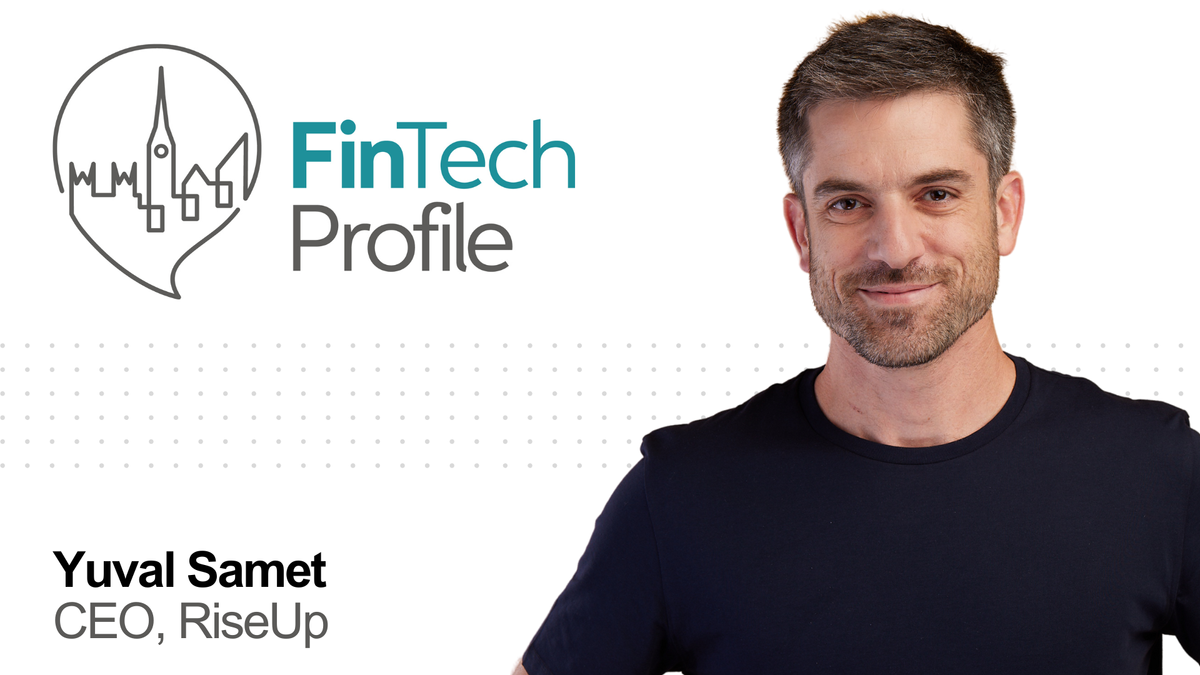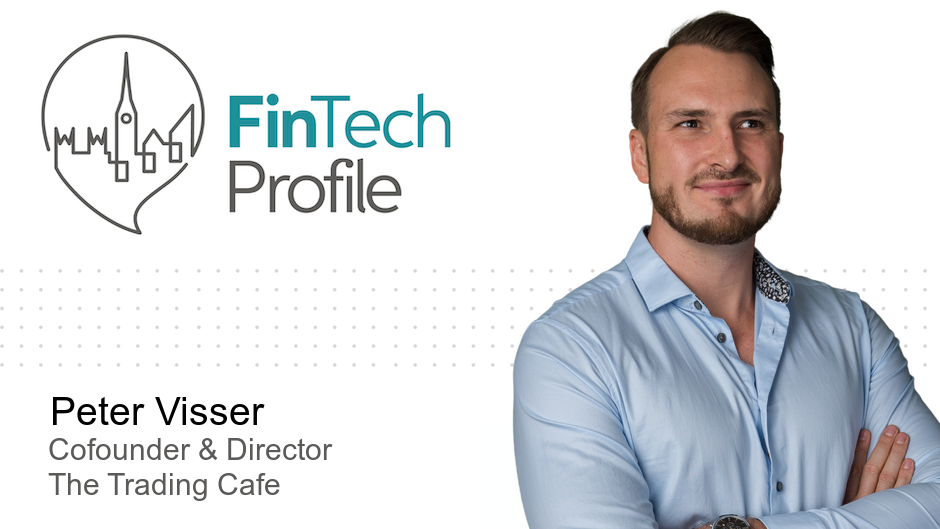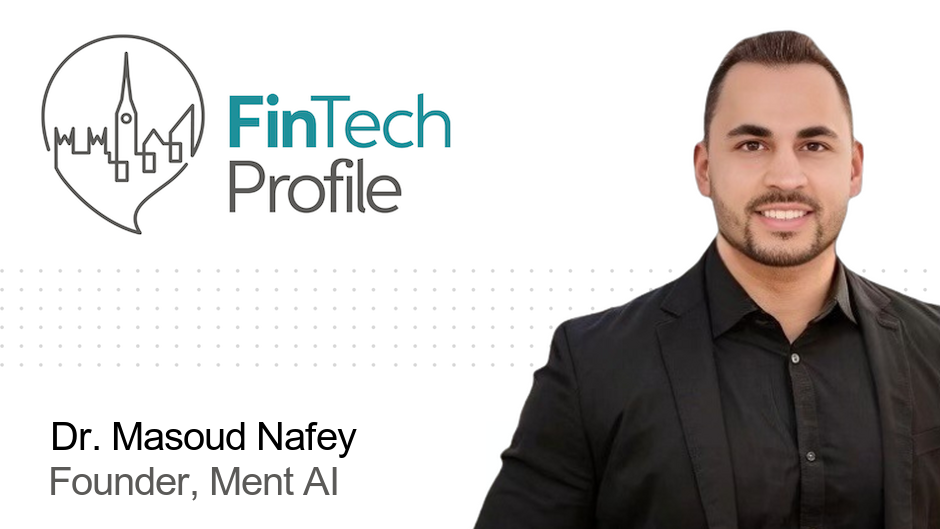Yuval Samet, CEO and co-founder, RiseUp

Today we're meeting Yuval Samet, CEO and co-founder at RiseUp. They specialize in financial wellbeing tools that help customers increase their monthly disposable income.
Over to you Yuval - my questions are in bold:
Who are you and what's your background?
I am Yuval Samet, CEO and co-founder of RiseUp. I grew up in a working class family where money was tight, but we enjoyed a fantastic non-formal education at home thanks to our amazing parents. They got us our first PC sometime around the late 80s, which led to my two brothers and I developing a lifelong love for technology and eventually becoming fintech entrepreneurs. We wanted to build products that would create a better life for the average household that usually felt left behind by technological advancements.
I've been lucky to have a life full of opportunities. Over my career, I've been able to play in the NBA of fintech. I spent five years working at Klarna, where I founded the company's product group as Chief Product Officer (CPO), and finally acted as Chief Technology Officer (CTO).
I strongly believe that everyone should be able to experience the same opportunities I had. However, unlocking opportunity requires access to financial resources and good education (whether formal or informal). My obsession with making this a reality on a global scale has been at the core of my journey as an entrepreneur.
Although my co-founders Tamara Harel-Cohen and Iftach Bar came from different backgrounds, we bonded around our mission to build a massive profit-with-purpose company that would unlock opportunities for millions of people worldwide.
Outside of work, I love the outdoors and try spending a lot of my time hiking, camping and mountain biking. Just sitting around in the middle of the desert is an activity I love and find energising. I have an incredible wife Yael, who is a yoga teacher, and we have two kids: Amit, a competitive horseback jumper, and Eytan, who loves football and ninja warrior training!
What is your job title and what are your general responsibilities?
As CEO, I lead our incredible team, dedicated to creating disposable income. We have two tools at our disposal, our consumer app that has redefined financial wellbeing, and our partnerships with financial institutions that help them improve engagement with their customers and increase assets under management.
I spend a lot of my time on overall strategy, but in my day-to-day role, I am mostly focused on building partnerships with financial institutions to support our growth in the UK.
Being CEO of a company in an intensive growth phase means that I end up tackling many different situations daily. I would say I spend 90% of my time on the commercial side of the house and 10% on anything reactive.
Can you give us an overview of your business?
RiseUp is an essential tool for achieving financial wellbeing. It gives the technology, tools, knowledge, and motivation to improve customers' mindsets about money, increase monthly disposable income, and feel financially powerful every day.
As UK households face the largest drop in disposable income on record, saving and building a positive financial future has become increasingly challenging. RiseUp's platform links to open banking data to automatically analyse and manage customers' monthly cash flow. It provides personalised suggestions and community support to help break the paycheck-to-paycheck cycle and begin asset building. RiseUp's unique personal recommendations model boosts customers' monthly disposable income by £390 on average.
RiseUp launched in the UK in 2024 and we're scaling our business through partnerships with financial institutions by helping them plug into the AI economy and leverage open banking data. Traditionally, leveraging open banking data has presented financial organisations with many challenges. By partnering with RiseUp, financial organisations can bypass these complexities and access their customer's unique data through RiseUp's app. This not only provides value to the organisation but also to the customer who receives personalised recommendations on tools to improve their finances.
Tell us how you are funded.
We are VC-backed fintech and thanks to our incredible team we're on the road to profitability later this year. We have passionate investors who are committed to the company's mission to make it easy for anyone to enjoy financial wellbeing. We believe every money flow should end with an opportunity to feel more financially powerful. Our investors help us stay focused on our social mission while delivering strong business results.
Founding a startup is a 10-year journey at least, and you must enjoy the journey with the right investors around the table. I am happy to say our investors, including Saul Klein from Latitude, Michael Eisenberg from Aleph, Jeff Swartz ex-owner CEO of Timberland, and Sir Ronald Cohen are incredible long-term players who help us stay committed at the highest level of intensity to making our vision a reality. One of the advantages of distributing through partnerships is that investors can be highly effective in introductions and deal-making, so some of our investors are our best sales guys!
What's the origin story? Why did you start the company? To solve what problems?
Tamara, Iftach, and I all shared a common goal of wanting to build a game-changing Profit-with-Purpose fintech company. We started looking for an issue we could solve by having hundreds of conversations with people about their day-to-day reality. It became clear that financial stress was dominating people's lives.
During my time at Klarna, I learned that impacting user experience by leveraging the customer's unique data is the most important thing regarding money. Yet, most personal finance tools available at the time provided a poor user experience that was not built with deep personalisation and the customer's wellbeing in mind.
Most of us don't manage our finances on Excel, hate the word 'budget' and struggle to understand the world of finance. So, we set out to create a new kind of financial service, one that is simple and personal for everyone and that puts your wellbeing first.
Who are your target customers? What's your revenue model?
RiseUp partners with financial institutions to give their customers the ability to leverage open banking data using our AI. This can help improve their ability to repay loans, increase deposit rates, and invest more money per month. It creates alignment between the partners, the customers, and RiseUp. Better customer performance means better financial outcomes for the partners, creating value for everyone.
RiseUp charges the partner for using the platform and the customer for using the subscription, so our revenue engines are appealing, scalable, and affordable for the payers as well.
With our partners, our target is open banking platforms and financial institutions that would like to transform their business into a fast-moving AI-driven revenue engine. We help savings banks, trading platforms and creditors to improve KPIs such as deposit volumes, monthly investment amounts and loan repayment rates.
For our customers, we mostly focus on young families, who experience a "responsibility trigger". This includes people who have just got married, had their first baby, and need to buy a car and pay a downpayment for an apartment. We do reach a wide audience, however, as getting ongoing support to improve disposable income and move the surplus to the right financial tools is appealing and relevant for all.
If you had a magic wand, what one thing would you change in the banking and/or FinTech sector?
The financial ecosystem is highly focused on compliance instead of being led by a brilliant user experience. When you optimise for a great user experience, then risk management, and last for compliance, you create a sense of urgency around customer value, which most of the financial ecosystem lacks. Brilliant user experience with accountability will govern the market better and improve the quality of services dramatically. Today's industry is too incentivised against innovation and rapid change.
What is your message for the larger players in the Financial Services marketplace?
The future of financial services lies in unique data. Models become a commodity very quickly. Financial institutions need to have a coherent data strategy and data advantage; aggregate relevant data, build unique data profiles, and serve their customers with the right value proposition at the right time. Data-driven products are becoming a common consumer expectation, however, most organisations are nowhere near ready to leverage it.
If you haven't already, you should stop everything you do for a few days and build your data and AI strategy. You must start now in small steps, it takes time to build proficiency. It feels like everybody is still stuck in a digital transformation project. This is old news. You should make AI an evolution of the business, not another transformation project. Start today, improve quickly and frequently, focus on customer value and transform the organization in small baby steps that will compound quickly.
Where do you get your Financial Services/FinTech industry news from?
Nowadays I get my news from LinkedIn. I love 11:FS, Simon Taylor, and Marcel Von Oost. I also read analyses from CBInsights, which I find always relevant and insightful.
Can you list 3 people you rate from the FinTech and/or Financial Services sector that we should be following on LinkedIn, and why?
I have somewhat of an uncommon angle: I believe every fintech company should think like Alex Hormozi nowadays. That translates into creating customer value, especially valuable content, that people are happy paying for online. It also means leveraging direct response methodologies to provide value effectively and monetise customers with full interest alignment. Buying traffic directly from a consumer is expensive and ineffective, and companies must build their own media assets and leverage them effectively.
I follow the best people in this domain on LinkedIn:
- Alex Hormozi: Master of direct response and customer acquisition. Follow to learn how to think about using proof to improve your ability to sell.
- Greg Isenberg: A thought leader of community building, often shares how he scales his bootstrapped businesses with many effective lessons learnt for any company.
- Daniel Bustamante: The best email marketer on LinkedIn. Mastering email marketing requires being sharp and coherent. I love his writing style which serves his profession.
What FinTech services (and/or apps) do you personally use?
I love Revolut & Wise. I think OakNorth savings products are also great and used Tandem lately and appreciated their green approach. Although I am not a customer, I think Female Invest is doing a phenomenal job and I find their Instagram content brilliant. In particular, their IG motion is super impressive and sets the bar high for amazing content and a sense of community. And, of course, I am a heavy user of RiseUp.
What's the best new FinTech product or service you've seen recently?
Recently, my daughter turned 13, and we decided to give her more freedom around some expenses, to start developing her money awareness. I gave her a Revolut card connected to my account, so now we have an ongoing conversation about spending and tradeoffs. I love the fact I get a push notification when she spends, and we get an opportunity to have a conversation about it.
Finally, let's talk about predictions. What trends do you think are going to define the next few years in the FinTech sector?
- The battle for Data Advantage: Companies will focus on creating unique and proprietary data profiles when they realise AI models are quickly commoditised. Building a new consumer profile based on unique engagement with the customer will define the opportunities brands can capture.
- Service Stickiness: Brands will continuously add new value to improve customer retention and stickiness. It will make differentiation hard, as all players will chase similar value propositions and features. We have seen it happening with brands like Chime and Sofi, who are great companies but not easily differentiated from the customer's perspective.
- Open banking enabled cooperation: Open banking standards are becoming more common globally. It will allow companies to build global cooperations based on a worldwide standard without the complexities around data transfer agreements and heavy localization. I believe we'll see financial institutions extending APIs with additional data points; the opportunities are limitless when data that has been locked in the basement of financial institutions will be accessible for 3rd party services.
Thank you very much, Yuval - nicely done!
Read more about Yuval on LinkedIn and find out more about RiseUp at www.letsriseup.com.




